Smile Confidently With Our Root Canal Treatment in Denver
Are you experiencing tooth pain for a long time? Don’t let the tooth pain affect your eating habits and beautiful smile. A simple root canal treatment might be an effective solution to this. At Carl F. Lipe’s dental clinic, we specialize in providing the best root canal treatment in Denver that can restore your oral health.
No more juggling with painful teeth, just visit or call us to schedule an appointment today
What Is Root Canal Treatment?
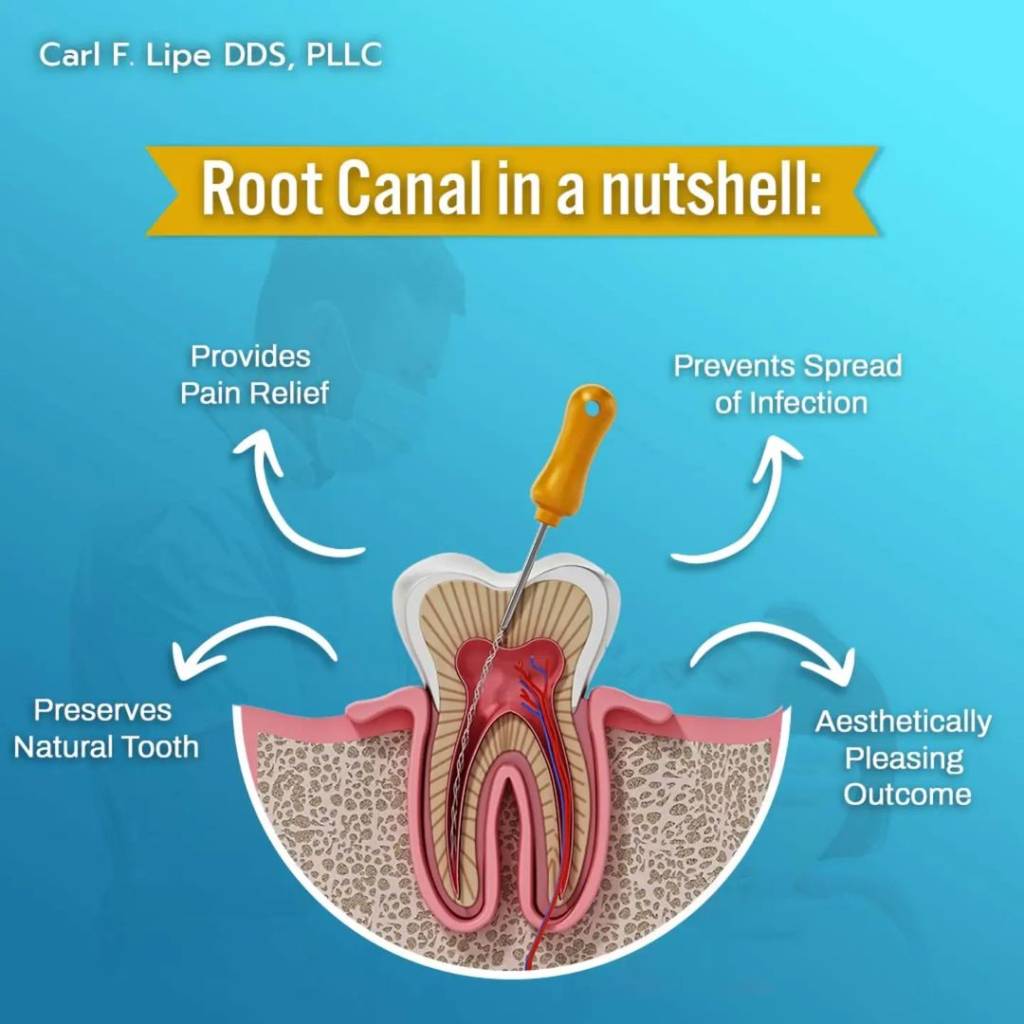
A root canal is an endodontic treatment designed to treat infection at the center of a tooth. Under the white enamel part of a tooth, there is a soft region named pulp. It mainly contains blood vessels, nerve endings, and connective tissues. Infection in this area can induce swelling or pain in the tooth.
This treatment involves removing the infected or damaged pulp, cleaning the inside of the tooth, and sealing it to prevent further infection. Our root canal specialist in Denver ensures that the process is as comfortable and efficient as possible.
When Is Root Canal Treatment Necessary?
The pulp region of a tooth can be damaged by various oral injuries, dental cavities, or trauma. Gradually, this damaged pulp starts causing pain and becomes extremely painful. Eventually, the pulp area gets infected and starts eroding your jawbone. If not treated, this infection will spread to the gums and affect the sinuses. This is the time when one requires a root canal treatment.
What Are The Benefits Of A Root Canal Treatment?
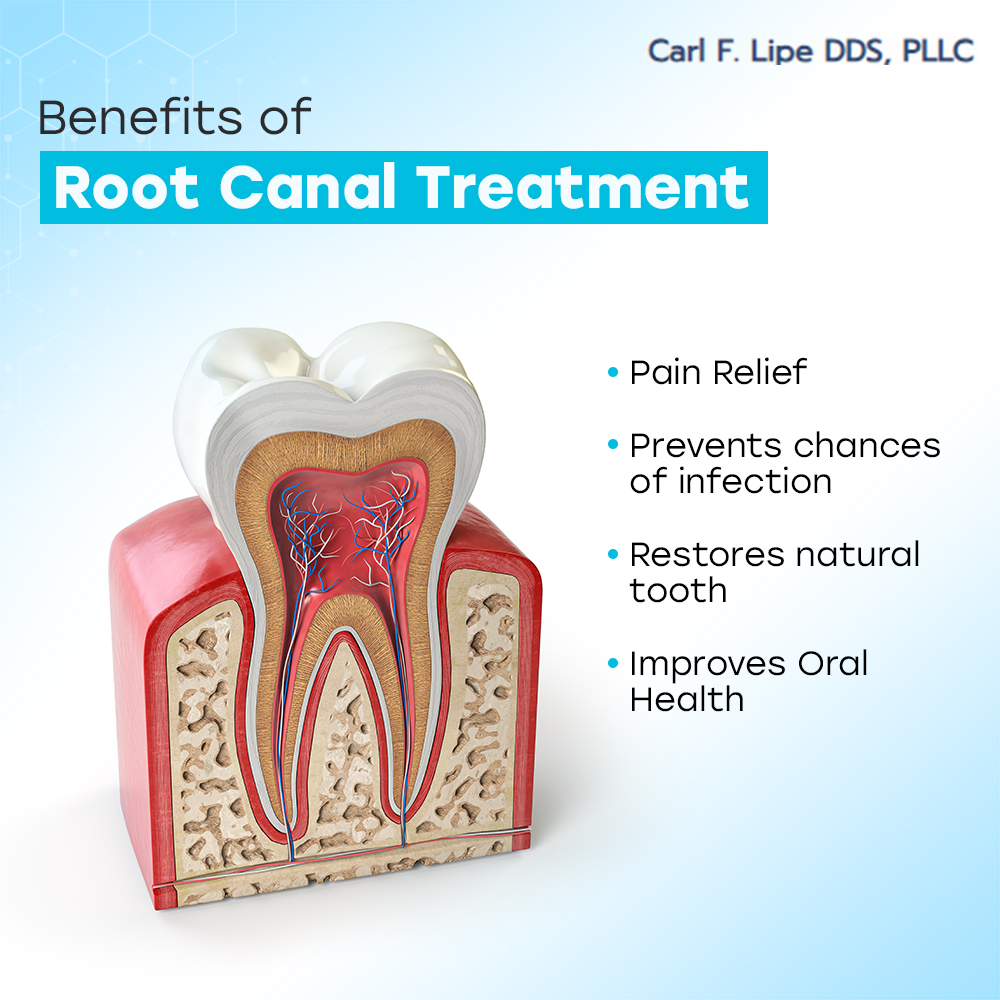
Opting for a root canal treatment in Denver can profoundly benefit your oral health and overall well-being. Here are the detailed advantages:
1. Pain Relief: One of the primary reasons patients seek a root canal is to alleviate severe tooth pain caused by infection or inflammation. The procedure removes infected pulp, which is the source of the pain, providing significant and
immediate relief.
2. Prevents Further Infection: When a tooth’s pulp becomes infected, the bacteria can spread to surrounding tissues, leading to abscesses and other serious health issues. A root canal eliminates the infection at its source, preventing the spread and protecting your oral and overall health.
3. Preserve Natural Tooth: Maintaining your natural teeth is crucial for proper chewing and speaking. By saving the affected tooth, a root canal helps you avoid the need for extraction and the subsequent need for prosthetics like bridges or implants. Keeping your natural teeth also helps maintain the structure of your jawbone and the alignment of your other teeth.
4. Restores Tooth Function: After a root canal, the treated tooth is typically restored with a crown or filling, allowing it to function just like any other tooth. This means you can continue to eat your favorite foods without discomfort or difficulty, and your bite remains strong and effective.
5. Improves Oral Health: An untreated infected tooth can lead to more severe oral health issues, including gum disease and jawbone loss. By addressing the problem promptly with a root canal, you improve your overall oral health and reduce the risk of future dental complications.
6. Aesthetically Pleasing Results: The final step of a root canal treatment often involves placing a crown or filling that matches the color and appearance of your natural teeth. This not only restores the tooth’s function but also ensures that your smile remains beautiful and natural-looking.
Why Choose Carl F. Lipe Endodontics For Root Canal Therapy In Denver, Co
Dr. Carl F Lipe, a renowned dentist from Colorado, Denver with years of expertise in various endodontic treatments ensures the best root canal treatment in Denver. With a rich educational background in microbiology and dental surgery and decades of perfecting his craft, Dr. Lipe brings a blend of science, artistry, and compassion to every patient. Our practice isn’t just about dentistry; it’s about setting a standard in patient care and oral health.
What Is The Cost of Root Canal Treatment In Denver, CO?
Treatment costs associated with the entire root canal process may vary depending on the severity of the damaged tooth and the type of tooth affected. A molar is more difficult to treat than an incisor or canine, so the cost for a molar is usually higher. Endodontic processes are less expensive than tooth extractions or replacement. Also, the insurance policies provide a certain amount of coverage for endodontic treatments. Our practice offers competitive pricing and flexible payment options to make the treatment accessible.
Average Costs
- Front Teeth (Incisors and Canines): The average cost ranges from $200 to $1,100.
- Premolars: The cost typically ranges from $800 to $1,200.
- Molars: Root canal treatment on molars is usually more complex and can cost between $1,000 and $1,500.
Factors Influencing the Cost
- Location and Expertise: Prices can vary depending on the dental office’s location and the dentist’s expertise. Specialists, such as endodontists, may charge more than general dentists.
- Initial Consultation: Some dental practices charge separately for the initial consultation and diagnostic tests, which can add $100 to $200 to the total cost.
- Additional Procedures: If additional procedures are required, such as dental crowns, the overall cost will increase. Crowns can cost between $800 and $1,500, depending on the material used.
- Insurance Coverage: Many dental insurance plans cover a portion of the root canal treatment cost. It’s essential to check with your insurance provider to understand the extent of your coverage.
Tips for Managing Costs
- Dental Insurance: Verify if your dental insurance plan covers root canal treatments and to what extent. Most plans cover a percentage of the treatment cost, typically ranging from 50% to 80%.
- Payment Plans: Many dental offices offer payment plans or financing options to help spread the cost over time.
- Get Multiple Quotes: Consider getting quotes from different dental practices to compare prices and find the best option for your budget.
- Dental Schools: Dental schools often offer lower-cost treatments performed by students under the supervision of experienced dentists.
By understanding these factors, you can better prepare for the financial aspect of getting a root canal treatment in Denver, CO, and explore options to make it more affordable.
How Do You Know When You Need Root Canal Treatment ?
If you are experiencing continuous inflammation, pain, or irritation in your tooth, or if you had any trauma that has damaged your tooth or noticed swelling and tenderness, you may be a good candidate for a root canal.
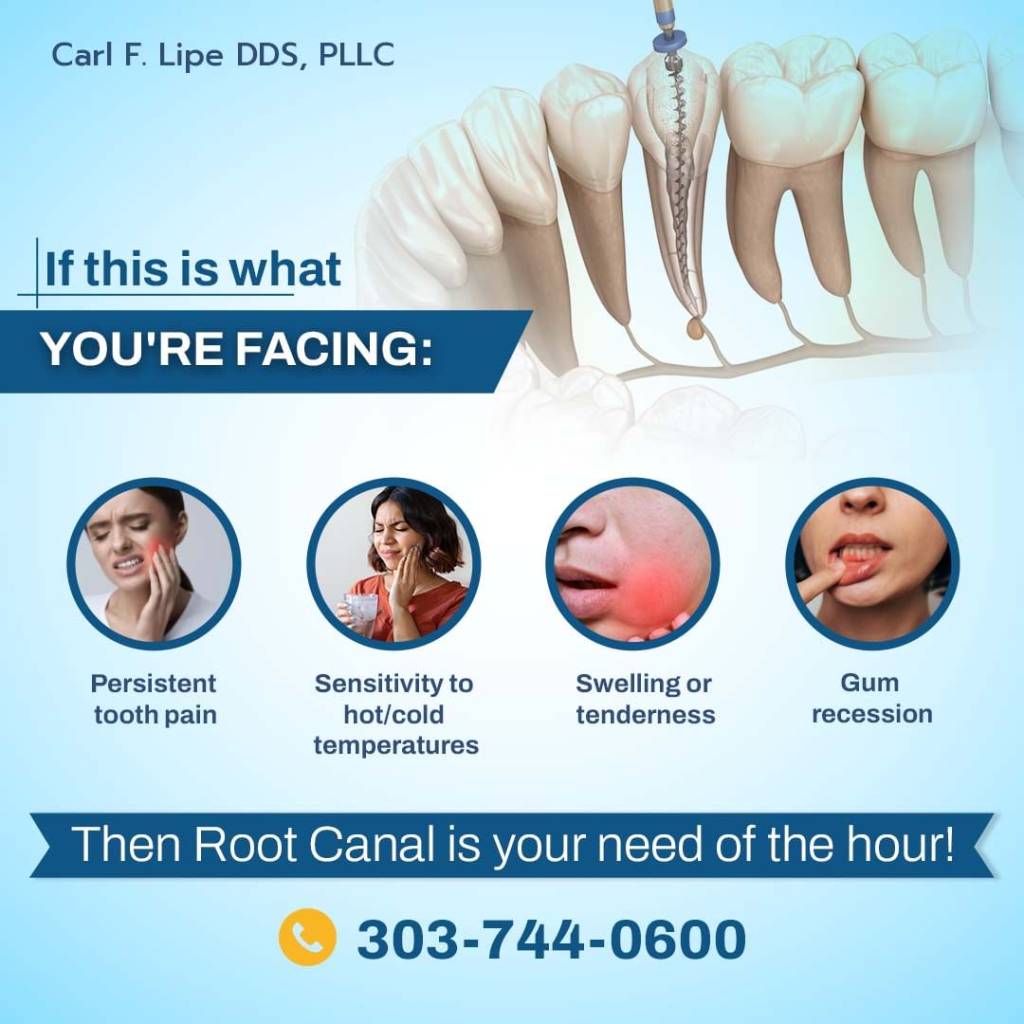
Steps Involved In A Root Canal Procedure
The root canal procedure is typically carried out in several stages –
- Step 1: Anesthesia is administered to ensure the patient’s comfort and the surgical field is isolated.
- Step 2: The infected or damaged pulp is removed, and the area is thoroughly disinfected.
- Step 3: The tooth is then filled with specific biocompatible materials, such as root canal cement, and then reconstructed.
- Step 4: For premolars or molars, it is usually recommended to apply a crown afterward, which provides greater strength and durability.
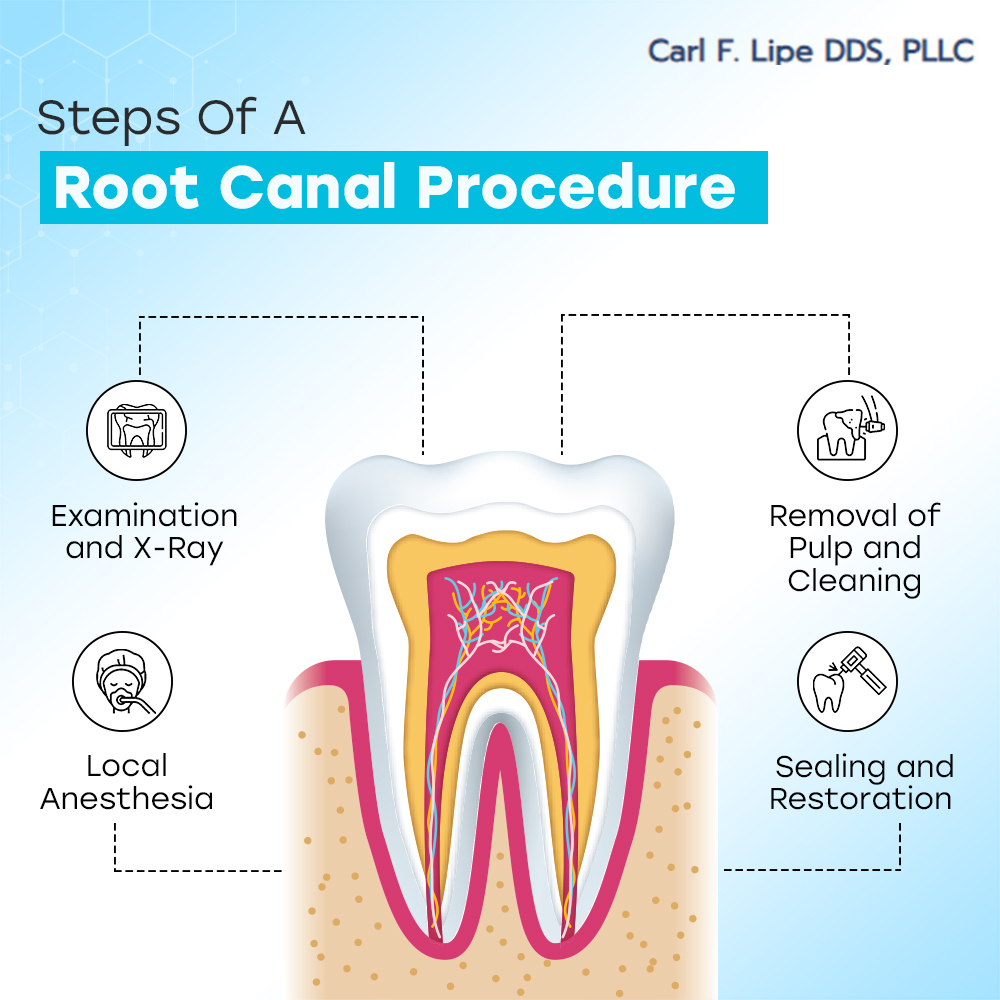
Post-Root Canal Care: Ensuring Optimal Healing and Comfort
To ensure optimal healing and comfort after your root canal treatment, follow these expert care tips:
1. Pain Management
- When using over-the-counter or prescription pain medications, follow your dentist’s instructions.
- To lessen discomfort and swelling, place an ice pack on the afflicted area and leave it there for 15 to 20 minutes.
2. Oral Hygiene
- To maintain cleanliness and avoid infection, gently brush and floss the region surrounding the treated tooth.
- Rinse your mouth with a mild saltwater solution to promote healing and reduce inflammation.
3. Diet and Nutrition
- Eat nothing sticky, crunchy, or hard that can irritate the tooth that has been treated.
- To reduce discomfort, chew on the other side of your mouth and choose soft foods.
4. Follow-Up Appointments
- Attend all scheduled follow-up appointments to monitor your healing progress and address any concerns.
- Consult Dr. Carl about any unusual discomfort or swelling to ensure that you receive timely care.
5. Rest and Recovery
- In the initial days following therapy, take it easy to enable your body to repair.
- Steer clear of demanding tasks that could make pain worse or prolong healing.
Root Canal vs Tooth Extraction: What Are The Main Differences?
When the nerves of a tooth get infected or damaged, dentists usually suggest a root canal or tooth extraction. Both of these can prevent the risks of infection and reduce pain, but they are slightly different. Let’s have a look into the main differences of these two
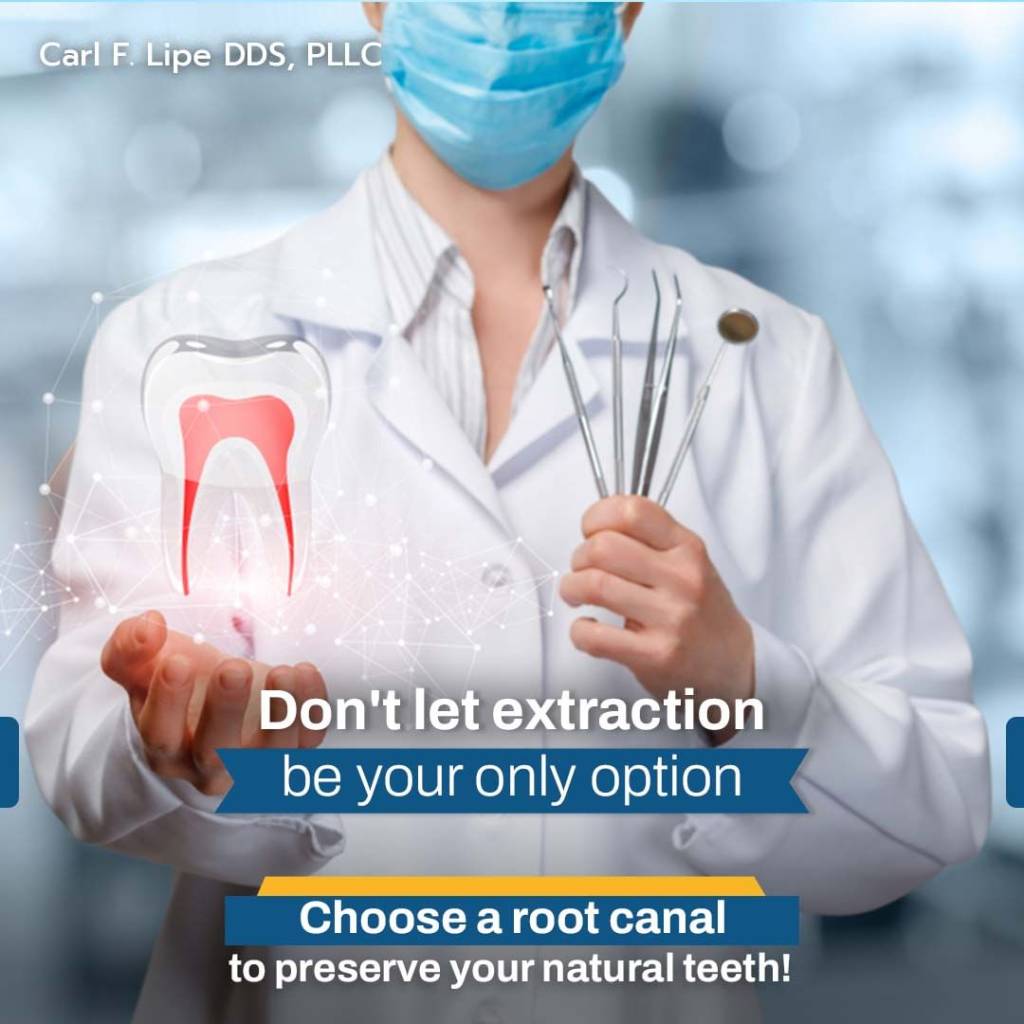
| Aspect | Root canal treatment | Tooth extraction |
|---|---|---|
| Process | Removes infected pulp, cleans and seals the tooth | Complete removal of the tooth from its bony socket |
| Pain and discomfort | Less painful and more comfortable | More uncomfortable and sometimes more painful |
| Tooth preservation | Preserves the natural tooth | Removes the natural tooth, creating a gap |
| Impact on bite | Maintains proper bite alignment | Missing tooth can cause shifting of adjacent teeth, affecting bite and chewing |
| Cost | Generally less expensive over time | Can be more costly due to the need for additional procedures (e.g., bone grafts, sinus lifts) |
| Durability | High success rate with proper care | Replacing teeth may require more maintenance |
| Aesthetic outcome | Retains the natural appearance of a tooth | Requires a prosthetic replacement which may not look or feel as natural |
Root Canal vs. Dental Implant: What Are The Main Differences?
Root Canal vs Dental Implant: Know the differences in detail.
| Aspect | Root canal treatment | Dental implant |
|---|---|---|
| Process | Removes infected pulp, cleans and seals the tooth | Replaces the missing tooth with a metal post and artificial crown |
| Pain and discomfort | Usually, less painful and more comfortable | More invasive process,potentially more discomfort |
| Tooth preservation | Preserves the natural tooth | Replaces the tooth with an artificial one |
| Impact on bite | Maintains proper bite alignment | Helps to maintain the alignment after tooth loss |
| Cost | Generally less expensive | Long-term durability can offset the higher upfront cost |
| Durability | High success rate with proper care | Extremely durable and long-lasting with proper maintenance |
| Aesthetic outcome | Retains the natural appearance of a tooth | May not match the appearance of natural teeth |
Fear Of Dental Visits? Worry Not, We Provide Sedation Dentistry
Dental anxiety is common but it shouldn’t hinder you from receiving the proper care. With the help of advanced techniques and sedation dentistry, we ensure the maximum level of comfort for the patients during their root canal process.
Book Your Free Root Canal Appointment in Denver Today
Take the initial step toward a pain-free radiant smile. Contact us today to book your free root canal treatment in Denver. Our team is dedicated to providing exceptional care and helping you achieve optimal oral health. Follow us on Facebook & Instagram for latest dental tips.
FAQ
Does root canal treatment hurt?
Root canal treatment is performed under local anesthesia, so one shall not experience any pain during the process. Any discomfort post-treatment can be managed with pain-relief medications.
What not to eat after root canal treatment?
One should avoid eating hard, sticky, chewy, or crunchy foods for a long time after the procedure. Stick to soft foods until the tooth is fully healed,
How many days will it take for root canal treatment?
The treatment typically requires one to two appointments, depending on the condition of the tooth and its complexity.
Is root canal treatment covered by insurance?
Yes, many dental insurance plans in Denver cover 50-80% of the cost of endodontic treatments like root canals.
